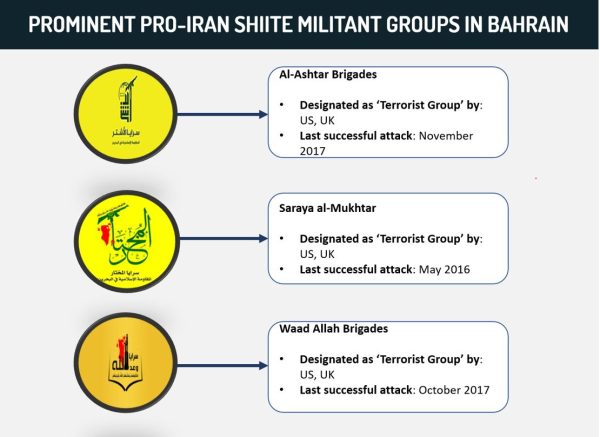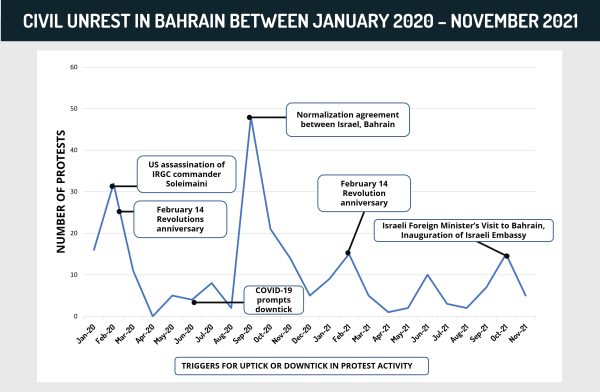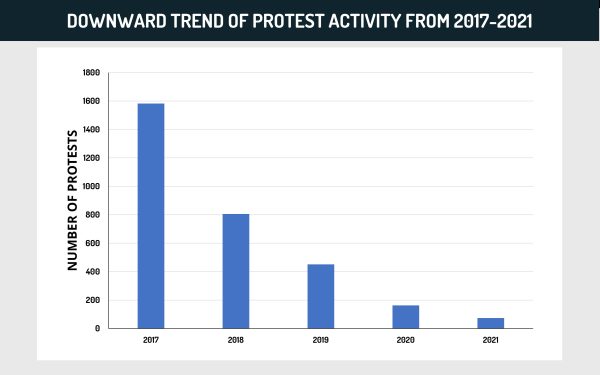23
Nov 2021
18:25 UTC
Bahrain Analysis: Arrest of militants plotting attacks on November 22 comes amid decline in militancy-related incidents, civil unrest; Bahrain’s security environment to be increasingly stable
Executive Summary
- On November 22, the Bahrain Ministry of Interior (MoI) announced that security forces arrested an unspecified number of suspected militants in possession of weapons and explosives who were planning attacks in the country. This shows that there is still an underlying threat of militancy, despite the overall downward trend in Bahrain over recent years.
- The MoI also stated that the arrestees have connections with militant organizations in Iran. Iran’s support to Bahraini Shiite militant groups will continue to strain Bahrain-Iran bilateral relations in the near-term and reinforce Manama’s perception of Iran as a destabilizing force.
- The development comes amid a long-term decrease in Shiite opposition activity and unruly demonstrations. This is primarily due to the government’s clampdown on Shiite opposition leaders and activists. However, a slight uptick in protest activity continues to be recorded during symbolic dates, deepening of ties with Israel, or the death of political prisoners.
- As the trend of both civil unrest and militancy-linked incidents are on a downward trajectory compared to previous years, the security environment in Bahrain will continue to be increasingly stable in the near future.
- Travel to Bahrain can continue at this time, while adhering to basic security precautions regarding civil unrest and low-level militancy. MAX Security has strong on-ground capabilities in Bahrain, including contingency planning and consultation. Contact us at operations@max-security.com or +44 20-3540-0434.
Assessments & Forecast:
Thwarted attack plot comes amid decline in militancy-related incidents
- Attempted or successful acts of militancy have been rare in Bahrain since 2018 owing to the authorities’ increased vigilance and crackdown on individuals and entities with suspected militant links. Most recently, masked assailants, perceived to be radicalized Shiite elements, set fire to an ATM belonging to a national bank in Muharraq’s Samaheej village on September 11. Prior to this, on February 6, 2021, the MoI announced the thwarting of two attempted militant attacks using explosives at ATMs near Manama. The last active militant attack that was partly successful was recorded on February 11, 2019, wherein the Bahraini Shiite militant group, Saraya Thar Allah, claimed a roadside IED explosion targeting security vehicles patrolling along the Sheikh Zayed Highway. Therefore, while there has been a significant decrease in both successful as well as foiled attack plots across Bahrain, the latest incident highlights the remaining threat stemming from Shiite militants and radicalized individuals in Bahrain.
- The discovery of weapons, and especially explosives, indicates that the militants had the means to conduct an imminent attack and possibly plotted to target security forces or installations affiliated with the Bahraini Sunni-led authorities. This is because Shiite militants and their supporters believe that the Bahraini government implements marginalizing policies against the Shiite population in the country. Although authorities have not specified the quantity or the type of explosives, they are likely to have been crude IEDs as this has been the modus operandi that has been most utilized by Shiite militants in the past. Regardless, the timely foiling of the attack underscores the Bahraini authorities’ heightened vigilance and alertness regarding the threat emanating from Shiite militant organizations and other radicalized elements within Bahraini society. This further showcases their intelligence-gathering capabilities to successfully thwart attacks before their successful materialization.
- FORECAST: Bahraini authorities will likely attempt to extract further actionable intelligence from the arrestees as part of the ongoing investigation. They will also continue to maintain vigilance and bolster their security protocols, particularly in Shiite populated areas, which may result in similar arrests over the coming months. Despite this, the latest development is not indicative of an upward trajectory in Shiite militancy-related incidents or attacks in Bahrain. The probability of a successful militant attack, especially one that is sophisticated in nature or that could lead to civilian casualties, remains very low at the current juncture.
Recent plot reiterates Iran’s involvement with domestic Shiite militant groups, will increase Bahraini government’s perception of Iran’s role as regional destabilizer
- In November 2020, Bahrain’s highest criminal court convicted 51 individuals with membership in a militant group that was planning to conduct attacks in Bahrain, with support from Iran. Bahrain has long accused Tehran of aiding both Shiite political opposition elements and militant groups, such as Saraya al-Ashtar or Saraya al-Mukhtar, which harbor significant grievances against the Bahraini Sunni ruling family. Most Shiite militant groups have openly pledged loyalty to the Islamic Republic and are considered to receive operational support from Iran in terms of training, finances, weapons, and other logistics. Several leaders of groups like Saraya al-Ashtar are also known to reside Iran.
- In this context, the Bahraini authorities’ statement that the arrestees had links to militant organizations in Iran likely means that the individuals were in communication with the members of one such Bahraini militant group that are currently residing in Iran. This would also lend credence to their statement that the weapons were sourced from Iran, which is bolstered by the Bahraini authorities’ previous allegations of Iran’s Islamic Revolutionary Guard Corps’ (IRGC) direct involvement in providing logistical support to militants.
- FORECAST: Iran’s likely involvement and support to Shiite militant groups in Bahrain will remain a national security concern for the authorities, which will continue to strain Bahrain-Iran bilateral relations in the near term. This incident will reinforce Manama’s perception of Tehran’s destabilizing role in the country, prompting the former to further clamp down on individuals and entities with suspected links to Iran.
Bahrain’s security environment to remain stable amid decreased trend of civil unrest, militant activity
- The latest incident also comes amid a broad decline in Shiite opposition activity and unruly anti-government demonstrations over recent months and even years. While non-disruptive, peaceful protest marches still occur within residential areas during night times, instances of civil unrest in the form of tire or garbage fires, hurling of fireworks, or Molotov cocktails against security forces have been increasingly infrequent over the past year compared with the prior years. This decline in unrest can be attributed to the Bahraini authorities’ extensive clampdown of Shiite opposition activity, which includes the imprisonment of their leaders and activists, the blocking of opposition-linked webpages and social media accounts, and the cancelation of the licenses of various entities to prevent them from functioning legally. These factors have severely impacted the mobilization capabilities of existing opposition groups.
- However, some sensitive subjects and symbolic dates still trigger a spike in the frequency and scale of unrest. These include the normalization agreement between Israel and Bahrain, the issue of political prisoners, the demise of Shiite opposition activists at the hands of security forces, or the anniversary of the 2011 Shiite protest movement in Bahrain in February. For example, most recently, the month of September marked the one-year anniversary of the normalization agreements between Israel and Bahrain as part of the US-brokered Abraham Accords. The period between September and early October was characterized by high-level diplomatic engagements between Israel and Bahrain, including the inauguration of the Israeli Embassy in Manama. Although these developments triggered a slight uptick in civil unrest, there has been an absence of such incidents denouncing Israel since October 15. On the whole, this highlights that the security environment in Bahrain is turning increasingly stable.
Recommendations:
- Those operating or residing in Bahrain are advised to maintain heightened vigilance while adhering to basic security precautions regarding the threat of militancy and civil unrest.
- Travel to Manama’s business and diplomatic districts, as well as the Seef District, can continue at this time while adhering to basic security precautions regarding civil unrest and low-level militancy.
- Be advised that government installations, checkpoints, police stations, and ATMs are potential targets for militant attacks involving Molotov cocktails or IEDs. Maintain vigilance for suspicious activity, items, or individuals as a security precaution near these sites.
- As a general rule, remain vigilant at checkpoints and when traveling during the nighttime hours due to an increased likelihood of unrest. In case a security checkpoint is encountered, act respectfully and patiently, while cooperating with security personnel. Additionally, refrain from photographing security personnel or documenting events.
- As a basic security precaution, avoid all demonstrations and political gatherings in Bahrain due to unrest emanating from such events.
Executive Summary
- On November 22, the Bahrain Ministry of Interior (MoI) announced that security forces arrested an unspecified number of suspected militants in possession of weapons and explosives who were planning attacks in the country. This shows that there is still an underlying threat of militancy, despite the overall downward trend in Bahrain over recent years.
- The MoI also stated that the arrestees have connections with militant organizations in Iran. Iran’s support to Bahraini Shiite militant groups will continue to strain Bahrain-Iran bilateral relations in the near-term and reinforce Manama’s perception of Iran as a destabilizing force.
- The development comes amid a long-term decrease in Shiite opposition activity and unruly demonstrations. This is primarily due to the government’s clampdown on Shiite opposition leaders and activists. However, a slight uptick in protest activity continues to be recorded during symbolic dates, deepening of ties with Israel, or the death of political prisoners.
- As the trend of both civil unrest and militancy-linked incidents are on a downward trajectory compared to previous years, the security environment in Bahrain will continue to be increasingly stable in the near future.
- Travel to Bahrain can continue at this time, while adhering to basic security precautions regarding civil unrest and low-level militancy. MAX Security has strong on-ground capabilities in Bahrain, including contingency planning and consultation. Contact us at operations@max-security.com or +44 20-3540-0434.
Assessments & Forecast:
Thwarted attack plot comes amid decline in militancy-related incidents
- Attempted or successful acts of militancy have been rare in Bahrain since 2018 owing to the authorities’ increased vigilance and crackdown on individuals and entities with suspected militant links. Most recently, masked assailants, perceived to be radicalized Shiite elements, set fire to an ATM belonging to a national bank in Muharraq’s Samaheej village on September 11. Prior to this, on February 6, 2021, the MoI announced the thwarting of two attempted militant attacks using explosives at ATMs near Manama. The last active militant attack that was partly successful was recorded on February 11, 2019, wherein the Bahraini Shiite militant group, Saraya Thar Allah, claimed a roadside IED explosion targeting security vehicles patrolling along the Sheikh Zayed Highway. Therefore, while there has been a significant decrease in both successful as well as foiled attack plots across Bahrain, the latest incident highlights the remaining threat stemming from Shiite militants and radicalized individuals in Bahrain.
- The discovery of weapons, and especially explosives, indicates that the militants had the means to conduct an imminent attack and possibly plotted to target security forces or installations affiliated with the Bahraini Sunni-led authorities. This is because Shiite militants and their supporters believe that the Bahraini government implements marginalizing policies against the Shiite population in the country. Although authorities have not specified the quantity or the type of explosives, they are likely to have been crude IEDs as this has been the modus operandi that has been most utilized by Shiite militants in the past. Regardless, the timely foiling of the attack underscores the Bahraini authorities’ heightened vigilance and alertness regarding the threat emanating from Shiite militant organizations and other radicalized elements within Bahraini society. This further showcases their intelligence-gathering capabilities to successfully thwart attacks before their successful materialization.
- FORECAST: Bahraini authorities will likely attempt to extract further actionable intelligence from the arrestees as part of the ongoing investigation. They will also continue to maintain vigilance and bolster their security protocols, particularly in Shiite populated areas, which may result in similar arrests over the coming months. Despite this, the latest development is not indicative of an upward trajectory in Shiite militancy-related incidents or attacks in Bahrain. The probability of a successful militant attack, especially one that is sophisticated in nature or that could lead to civilian casualties, remains very low at the current juncture.
Recent plot reiterates Iran’s involvement with domestic Shiite militant groups, will increase Bahraini government’s perception of Iran’s role as regional destabilizer
- In November 2020, Bahrain’s highest criminal court convicted 51 individuals with membership in a militant group that was planning to conduct attacks in Bahrain, with support from Iran. Bahrain has long accused Tehran of aiding both Shiite political opposition elements and militant groups, such as Saraya al-Ashtar or Saraya al-Mukhtar, which harbor significant grievances against the Bahraini Sunni ruling family. Most Shiite militant groups have openly pledged loyalty to the Islamic Republic and are considered to receive operational support from Iran in terms of training, finances, weapons, and other logistics. Several leaders of groups like Saraya al-Ashtar are also known to reside Iran.
- In this context, the Bahraini authorities’ statement that the arrestees had links to militant organizations in Iran likely means that the individuals were in communication with the members of one such Bahraini militant group that are currently residing in Iran. This would also lend credence to their statement that the weapons were sourced from Iran, which is bolstered by the Bahraini authorities’ previous allegations of Iran’s Islamic Revolutionary Guard Corps’ (IRGC) direct involvement in providing logistical support to militants.
- FORECAST: Iran’s likely involvement and support to Shiite militant groups in Bahrain will remain a national security concern for the authorities, which will continue to strain Bahrain-Iran bilateral relations in the near term. This incident will reinforce Manama’s perception of Tehran’s destabilizing role in the country, prompting the former to further clamp down on individuals and entities with suspected links to Iran.
Bahrain’s security environment to remain stable amid decreased trend of civil unrest, militant activity
- The latest incident also comes amid a broad decline in Shiite opposition activity and unruly anti-government demonstrations over recent months and even years. While non-disruptive, peaceful protest marches still occur within residential areas during night times, instances of civil unrest in the form of tire or garbage fires, hurling of fireworks, or Molotov cocktails against security forces have been increasingly infrequent over the past year compared with the prior years. This decline in unrest can be attributed to the Bahraini authorities’ extensive clampdown of Shiite opposition activity, which includes the imprisonment of their leaders and activists, the blocking of opposition-linked webpages and social media accounts, and the cancelation of the licenses of various entities to prevent them from functioning legally. These factors have severely impacted the mobilization capabilities of existing opposition groups.
- However, some sensitive subjects and symbolic dates still trigger a spike in the frequency and scale of unrest. These include the normalization agreement between Israel and Bahrain, the issue of political prisoners, the demise of Shiite opposition activists at the hands of security forces, or the anniversary of the 2011 Shiite protest movement in Bahrain in February. For example, most recently, the month of September marked the one-year anniversary of the normalization agreements between Israel and Bahrain as part of the US-brokered Abraham Accords. The period between September and early October was characterized by high-level diplomatic engagements between Israel and Bahrain, including the inauguration of the Israeli Embassy in Manama. Although these developments triggered a slight uptick in civil unrest, there has been an absence of such incidents denouncing Israel since October 15. On the whole, this highlights that the security environment in Bahrain is turning increasingly stable.
Recommendations:
- Those operating or residing in Bahrain are advised to maintain heightened vigilance while adhering to basic security precautions regarding the threat of militancy and civil unrest.
- Travel to Manama’s business and diplomatic districts, as well as the Seef District, can continue at this time while adhering to basic security precautions regarding civil unrest and low-level militancy.
- Be advised that government installations, checkpoints, police stations, and ATMs are potential targets for militant attacks involving Molotov cocktails or IEDs. Maintain vigilance for suspicious activity, items, or individuals as a security precaution near these sites.
- As a general rule, remain vigilant at checkpoints and when traveling during the nighttime hours due to an increased likelihood of unrest. In case a security checkpoint is encountered, act respectfully and patiently, while cooperating with security personnel. Additionally, refrain from photographing security personnel or documenting events.
- As a basic security precaution, avoid all demonstrations and political gatherings in Bahrain due to unrest emanating from such events.




